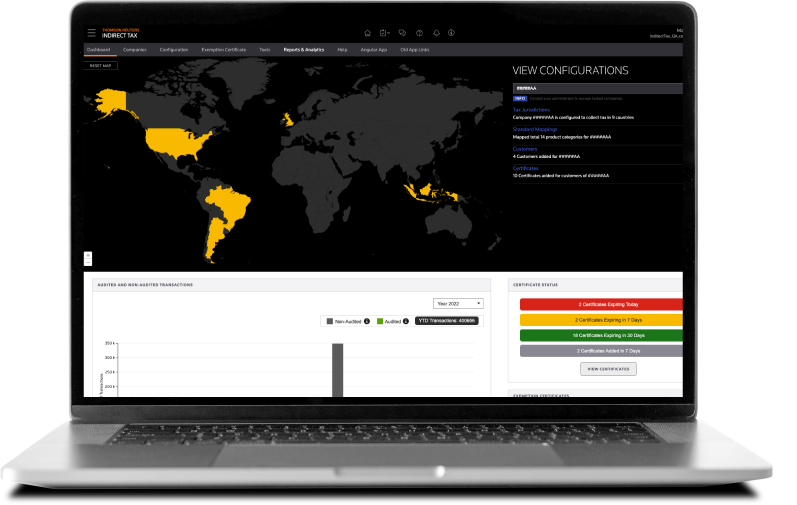Discover how to future-proof compliance and maintain a competitive edge with Thomson Reuters and Oracle
Global indirect tax and e-invoicing compliance is more critical than ever, with corporations needing to navigate a complex web of regulations and mandates. For global companies, the stakes are high: non-compliance can result in substantial financial penalties, increased audit risk, and reputational damage. Given these potential pitfalls, ensuring a robust and adaptable tax compliance strategy is essential for maintaining a competitive edge.
At the Oracle CloudWorld 2024 event, leaders from Thomson Reuters focused on future-proofing your approach to global indirect tax and e-invoicing compliance. They highlighted the rising business risks driving the need for advanced technology solutions, the complexities of real-time e-invoice reporting, and the significance of adopting centralized tax reporting. The discussion underscored the importance of technology partnerships in addressing compliance gaps, particularly through the integration of Thomson Reuters tax solutions with Oracle’s ERP systems.
Highlights:
|
Jump to ↓
Trends increasing business risk
In today’s fast-changing global market, corporations must ensure global tax compliance using standardized operations and centralized tax management. Brad Colie, Director of Pagero Sales at Thomson Reuters, called attention to global regulatory trends increasing business risks. These trends are driving the need for enhanced tax compliance strategies and advanced e-invoicing processes:
- Increased tax audits: Frequent and stringent tax audits are on the rise. The 2024 State of the Corporate Tax Department found that on average 62% of businesses were audited last year, with under-resourced departments (72%) experiencing higher audit rates and facing average fines of $50,000.
- Continuous tax law changes: Legislative changes are accelerating, influenced by economic and market conditions like inflation and global pandemics. The government aims to boost tax revenues to lessen reliance on income tax.
- E-Invoicing mandates: Numerous countries are mandating real-time e-invoicing to close VAT gaps and increase revenue. The invoices must be sent to the corresponding government before products or services reach consumers.
- More “green” fees and taxes: New environmental taxes and fees are constantly being instated and often change. Different industries face various policies and fees. Businesses must keep accurate records, report on time, and account for all taxable activities to avoid significant penalties.
In addition, companies integrating new technology solutions to avoid these risks must be vigilant about potential security issues. They must ensure their systems are robust and continuously protected against ongoing cyber threats. Failure to do so could result in severe legal repercussions and damage their reputation. Staying ahead of global regulatory requirements and implementing stringent data security measures will be crucial as technology evolves.
 |
|
Real-time global e-invoice reporting challenges
The convergence of e-invoicing and tax is a critical trend. Real-time e-invoice reporting is seen as the key to closing the VAT gap, which is estimated to be €124 billion in the EU. For example, Italy saw a revenue increase of €3.5 billion in 2019 due to its Continuous Transaction Controls (CTC) system.
The tax department is now a key influencer in these mandates, although it does not own the budget. Accurate upfront tax calculations are essential to avoid higher operational and compliance costs, such as cancel/rebills, delayed billing and payment, reconciliation with VAT returns, and increased audit exposure.
Adam Schaffner, Director of Product for Indirect Tax at Thomson Reuters, discussed the increasing complexity of real-time global e-invoice compliance. He states that in a recent study it showed real-time reporting is becoming the new normal, with 83 countries already mandating these requirements. By 2025, 80% of companies will be forced to adapt to e-invoicing requirements, with numerous developments coming in the next 2-4 years.
These mandates often involve intricate, country-specific requirements, posing a significant challenge for multinational corporations. Key global tax challenges include complying with diverse and evolving e-invoicing mandates, inefficiencies from localized tax operations, lack of centralized control, and the complexities of changing tax laws.
Thomson Reuters and Oracle: Working together to drive customer success
Amita Prabhu, Vice President of Product Engineering at Thomson Reuters, highlighted the 20-year partnership between Thomson Reuters and Oracle. She focused on their seamless collaboration that offers a comprehensive end-to-end solution and e-invoice compliance. ONESOURCE solutions address income tax, tax provision, statutory reporting, global trade, indirect tax, and e-invoicing. All of which provides a holistic approach to managing tax and trade complexities.
The ONESOURCE Indirect Tax suite runs natively on Oracle Cloud Infrastructure (OCI) and with its pre-built connector, seamlessly integrates with Oracle Fusion Cloud ERP, ensuring accurate tax calculations and tax filings. ONESOURCE Pagero with its pre-built connector for Oracle ensures global e-invoice compliance, and automated AR/AP processes. As an Oracle ISV partner, Thomson Reuters deploys its core products and integrations on OCI.
ONESOURCE global trade solutions have helped customers save over a billion dollars in duties by managing foreign trade zones and leveraging free trade agreements.
|
Amita Prabhu
Vice President, Product Engineering at Thomson Reuters
Thomson Reuters’ solutions, fully integrated with Oracle, address challenges in fragmented tax reporting and e-invoicing compliance by centralizing, standardizing and streamlining processes to meet global regulatory requirements. These tools use pre-built connectors for seamless integration, swift deployment, enhanced accuracy and eliminated reconciliation issues.
For the case study Why Thomson Reuters and how we helped JLL, Jones Lang LaSalle (JLL) faced issues with decentralized management of tax reporting and e-invoicing compliance, which required excessive effort on tactical work and increased risk. They implemented a solution that standardized and simplified operating procedures, ensuring all regulatory requirements were met. They use ONESOURCE products including Indirect Tax Compliance, Pagero, Statutory Reporting, Checkpoint Research, and Legal Tracker. As a result, JLL reduced their compliance risk and improved team efficiency by 60%.
Product solutions for global indirect tax compliance success
Oracle and Thomson Reuters integrated solutions assist tax teams with global compliance and regulatory changes. These include ONESOURCE Determination for automated tax calculations, Pagero for e-invoicing across multiple countries, and ONESOURCE Indirect Tax Compliance for centralized tax operations. These tools aim to enhance accuracy, reduce risks, and streamline tax processes within Oracle systems, supporting businesses in adopting advanced e-invoicing solutions, automating sales tax processes, and standardizing tax operations globally.
Learn more about Thomson Reuters and Oracle’s integrated product solutions to help your business achieve global tax compliance.
 |
|
 |
|